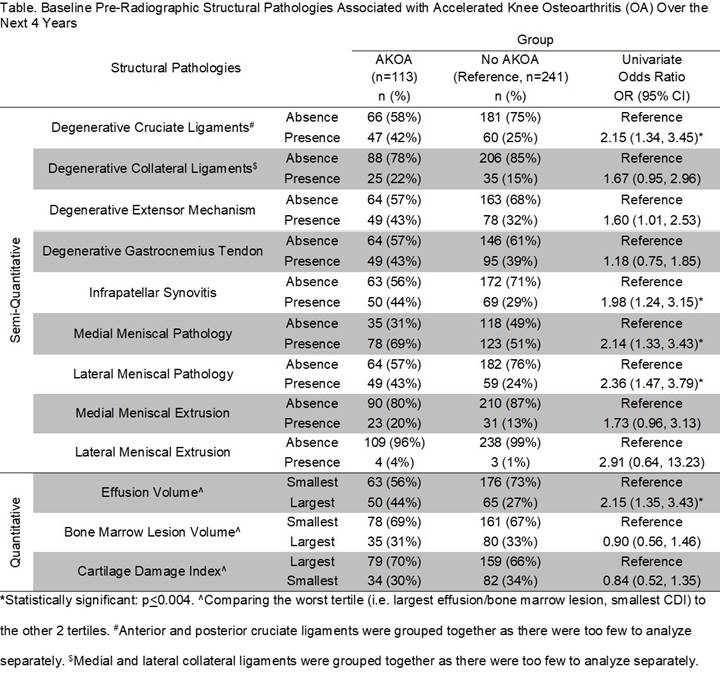Session Information
Session Type: ACR Poster Session A
Session Time: 9:00AM-11:00AM
Methods: The sample comprised participants from the Osteoarthritis Initiative (OAI) who had at least one radiographically normal knee at baseline (Kellgren-Lawrence [KL] grade ≤1). Participants were classified into 2 groups based on radiographic disease progression from baseline to 48 months: AKOA (KL grade change from ≤1 to ≥3) and No AKOA. Magnetic resonance images were assessed for the presence of 9 semi-quantitative structural pathologies and separated into tertiles for 3 quantitative pathologies at the OAI baseline (Table). For the quantitative pathologies, we converted the tertiles to a dichotomous variable to compare the worst tertile (i.e. largest bone marrow lesion and effusion, smallest cartilage damage index) to the combination of the other two tertiles. Logistic regressions were used to determine which pre-radiographic structural pathologies were more likely to antedate the development of AKOA compared to individuals not developing AKOA.
Results: Overall the groups were predominantly female (63%), overweight, and 33% reported frequent knee pain within a year of baseline. At the OAI baseline visit, degenerative cruciate ligaments (odds ratio [OR]=2.2, 95% confidence interval [CI]=1.3,3.5), infrapatellar synovitis (OR=2.0, 95%CI=1.2,3.2), medial meniscal pathology (OR=2.1, 95%CI=1.3,3.4), lateral meniscal pathology (OR=2.4, 95%CI=1.5,3.8) and larger quantitative knee effusion (OR=2.2, 95%CI=1.4,3.4) were more likely to antedate the development of AKOA when compared to those that did not develop AKOA (Table).

To cite this abstract in AMA style:
Harkey M, Davis J, Lu B, Price LL, Ward RJ, MacKay J, Eaton CB, Lo GH, Barbe M, Zhang M, Pang J, Stout A, McAlindon TE, Driban JB. Early Pre-Radiographic Structural Pathology Precedes the Onset of Accelerated Knee Osteoarthritis: Data from the Osteoarthritis Initiative [abstract]. Arthritis Rheumatol. 2018; 70 (suppl 9). https://acrabstracts.org/abstract/early-pre-radiographic-structural-pathology-precedes-the-onset-of-accelerated-knee-osteoarthritis-data-from-the-osteoarthritis-initiative/. Accessed .« Back to 2018 ACR/ARHP Annual Meeting
ACR Meeting Abstracts - https://acrabstracts.org/abstract/early-pre-radiographic-structural-pathology-precedes-the-onset-of-accelerated-knee-osteoarthritis-data-from-the-osteoarthritis-initiative/
